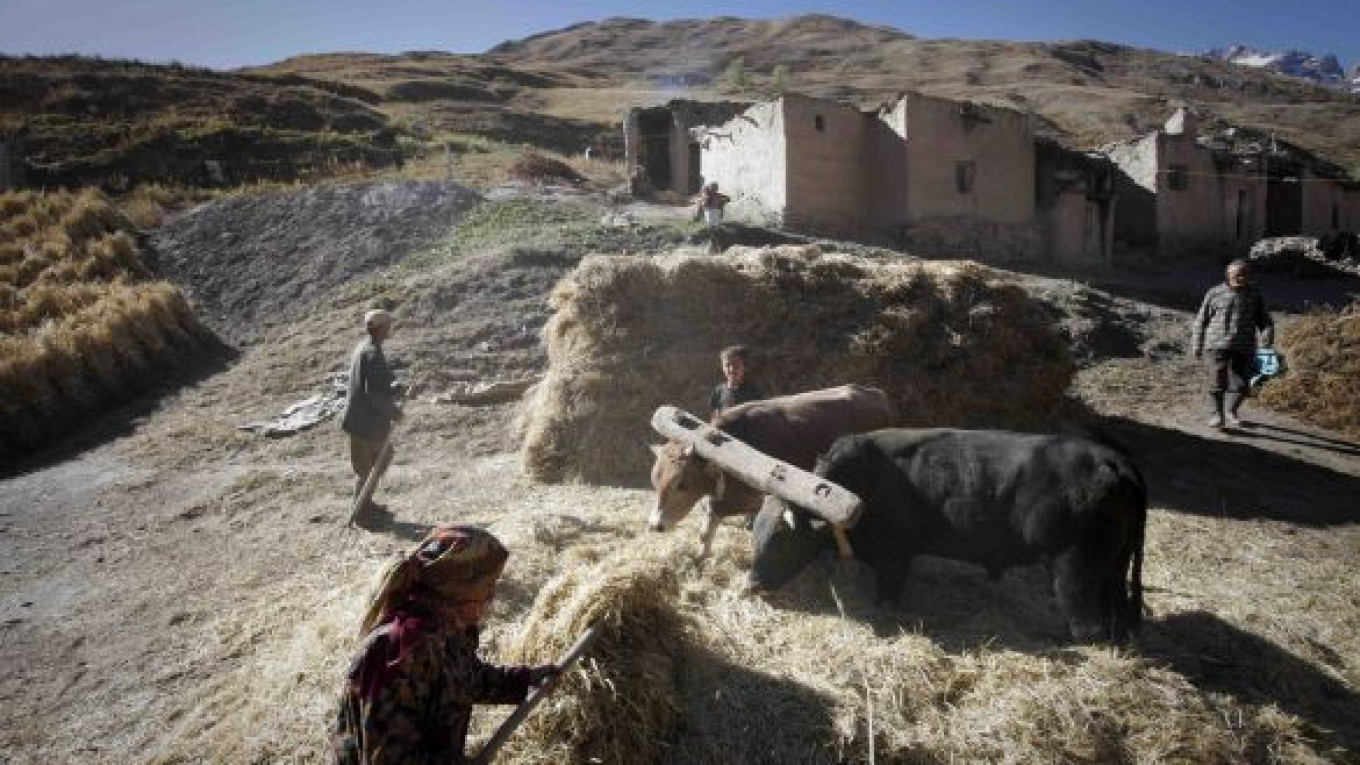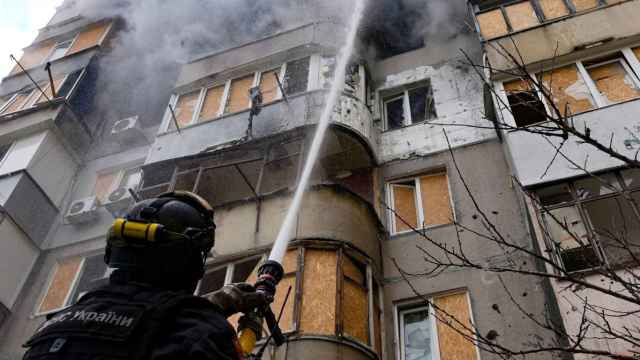DUSHANBE, Tajikistan — They call him Tajikistan's Osama bin Laden.
In the wild mountains east of the capital, Dushanbe, thousands of soldiers are on the hunt for a man authorities say is masterminding a plot to turn this impoverished and unstable country on Afghanistan's northern border into a haven for Islamist terrorists.
Tajikistan holds great strategic importance in the NATO military campaign in Afghanistan, serving as a link in supply routes — and news of an uncontained conflict here in the pursuit of a purported terrorist chieftain is causing alarm in Western capitals.
Tajikistan's value as a supply channel has only increased in recent weeks as the main route through Pakistan has come under pressure by repeated militant attacks on tanker trucks carrying fuel.
An Islamist insurgency in Tajikistan led by Mullo Abdullo would therefore have deep consequences for the U.S.-led campaign against terror.
Many observers, however, compare Mullo Abdullo to bin Laden for reasons other than purported terror prowess: Like the al-Qaida leader, the Tajik is legendary for his elusiveness. Some believe that Mullo Abdullo has been dead for years and that his specter has been resurrected as an excuse to quash the remnants of armed resistance to the government.
"Mullo Abdullo has become the bin Laden of Tajikistan — now you see him, now you don't," said Rakhmatullo Zoirov, chairman of the opposition Social Democratic Party.
Telephone communication with the area where the manhunt is being carried out has been severed for weeks, and only unreliable government reports are available about the number of casualties among government troops.
Security sweeps have been taking place for several weeks in Tajikistan's Rasht Valley, a winding cleft surrounded on both sides by rugged mountains, to flush out what the government has described as Islamist terrorists.
Recent incidents in Tajikistan certainly bear all the hallmarks of an Islamist insurgency.
An ambush on a military convoy last month left at least 26 soldiers dead in a gorge along the Rasht Valley. That came in the wake of two terrorist blasts and a daring prison escape by 25 convicted Islamist militants and government opponents.
The Defense Ministry swiftly blamed the mountain ambush on Mullo Abdullo — the nom de guerre of Abdullo Rakhimov, a leading commander during Tajikistan's 1992-97 civil war between President Emomali Rakhmon's government of former Soviet loyalists and the mostly Islamic opposition.
The government led by Rakhmon, like those of many countries in the region, is deeply authoritarian and allows for no real dissent. Authorities waver in their loyalties to Moscow and Washington.
As part of a peace deal that ended the civil conflict, which left more than 100,000 dead, several major opposition figures joined the government. But the radical wing of the United Tajik Opposition refused to participate in the power-sharing agreement and many, including Mullo Abdullo, are believed to have taken refuge in Afghanistan.
According to vague and wildly contradictory accounts, Mullo Abdullo is believed either to have allied himself with the Taliban in Afghanistan or joined forces with their bitter opponent, ethnic Tajik warlord Shah Ahmad Massoud.
From that point onward, almost nothing is known of Mullo Abdullo's fate.
Last year, Tajik authorities announced that he had returned to his home country with a gang of foreign fighters in tow.
Leaflets posted on notice boards around the country featured a grainy picture of Mullo Abdullo, a list of his offenses and the year of his birth, 1950.
His wife, who still lives in a village near the capital, told local newspaper Asia-Plus in a recent interview that when she last saw Mullo Abdullo two decades ago, he was missing a lung and suffered from ailments in his liver and kidneys.
Under the guise of a drug eradication drive, the army launched a military operation to nab Mullo Abdullo in the Rasht district that culminated last July in the capture of several foreign fighters and the killing of former opposition commander Mirzo Ziyoyev.
It was the death of Ziyoyev, accused by police of being a major drug-runner, which aroused suspicions that the authorities were actually pursuing government opponents under the pretext of fighting Islamist radicals.
"They said the operation in which they got Ziyoyev was aimed at Mullo Abdullo," said Khikmatullo Saifullozoda, a leading figure in the prominent opposition Islamic Revival Party. "But why did they call the hunt off as soon as Ziyoyev was out of the picture?"
Although the government opposition during the civil war largely constituted Islamist fighters, most commanders eschewed the nihilist extremism of terrorist groups such as the Islamic Movement of Uzbekistan, which has been linked to Mullo Abdullo. Some experts believe, though, that the government's crude security policy could serve to drive them into the arms of unlikely bedfellows.
"The lines dividing Islamists from Islamic-rooted opposition remain blurred and Rakhmon's heavy-handed approach may tilt many who previously were neutral toward the IMU to join forces against the Tajik president," IHS Global Insight analyst Lilit Gevorgyan wrote in a recent report.
The campaign to hunt down Mullo Abdullo resumed this summer, but was disastrously derailed when two trucks packed with young soldiers came under heavy fire in the Komarob gorge, leaving dozens dead.
Days after naming Mullo Abdullo as the most likely culprit, authorities declared a manhunt for another former opposition warlord, Mirzokhodzha Akhmadov, in connection with the ambush.
Akhmadov was one of the former opposition commanders who opted to take up a government post as a result of peace talks, although he still strenuously resisted the government's attempt to assert its authority over his native Rasht district. The definitive split with the government came in 2008, when Akhmadov was accused of murdering a visiting top Interior Ministry official.
Suggestions that he has been actively engaged with terrorist organizations are met with skepticism.
"The government is in a perennial search for new enemies and terrorists," said Zoirov of the opposition Social Democratic Party.
In the search for Mullo Abdullo, Akhmadov and others, the Tajik armed forces deployed thousands of soldiers in the mountains around the Rasht Valley.
Numerous checkpoints manned by machine gun-wielding soldiers have been erected leading east out of Dushanbe. Truckloads of young conscripts regularly rumble into the valley, and locals say military helicopters have been hovering over the mountains with increasing regularity.
There has been little official information about the fighting, and police have barred access for foreign journalists, citing security concerns.
On the eve of taking flight after a botched operation to capture him left five of his men dead, Akhmadov told an Associated Press reporter that at least 50 former fellow fighters had taken shelter in the mountains over concern that they would be arrested.
What has the West worried is the prospect of an long-term insurgency, inspired by Islamist radicalism or otherwise.
Western diplomats in Tajikistan fear that the government's inability to neutralize Akhmadov could undermine its authority and in turn threaten the future stability of the country, which acts as the first line of defense against the flood of Afghan heroin pouring into the West.
Domestically, many are concerned that amid justified concern over an upsurge in militant activity, which some military analysts believe may be a spillover of violence from Afghanistan, the government has sought to stamp out even the legitimate opposition.
Saifullozoda of the Islamic Revival Party, the only legally registered Islamic political party in Central Asia, said his own group has come under pressure since the start of military operations.
The decision to allow the registration of the Islamic Revival Party, formerly the main constituent component of the United Tajik Opposition, was hailed as a sign of moderation that would ensure peace and prevent a renewed descent into civil conflict. In recent years, however, the party has come under growing pressure and it was deprived of any significant representation in a parliamentary election earlier this year that was deemed as flawed by international monitors.
Party officials also complain that its moderating influence has been dashed by the government's heavy-handed approach to stamping out any traces of radical Islam. This year alone, hundreds of young men have been handed sentences of up to 15 years in jail for belonging to banned Islamist groups.
President Rakhmon has also angered many by speaking out against Islamic head dress and calling for the return home of pupils at religious schools overseas.
"If we are now seeing religious extremism, it is simply a consequence of secular radicalism," said Saifullozoda of the Islamic Revival Party.
A Message from The Moscow Times:
Dear readers,
We are facing unprecedented challenges. Russia's Prosecutor General's Office has designated The Moscow Times as an "undesirable" organization, criminalizing our work and putting our staff at risk of prosecution. This follows our earlier unjust labeling as a "foreign agent."
These actions are direct attempts to silence independent journalism in Russia. The authorities claim our work "discredits the decisions of the Russian leadership." We see things differently: we strive to provide accurate, unbiased reporting on Russia.
We, the journalists of The Moscow Times, refuse to be silenced. But to continue our work, we need your help.
Your support, no matter how small, makes a world of difference. If you can, please support us monthly starting from just $2. It's quick to set up, and every contribution makes a significant impact.
By supporting The Moscow Times, you're defending open, independent journalism in the face of repression. Thank you for standing with us.
Remind me later.






